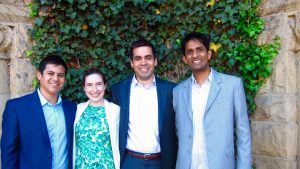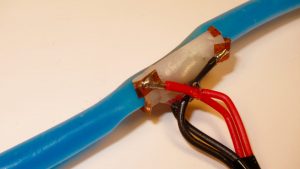Stanford University

 2015 BMEidea Third Prize Winner
2015 BMEidea Third Prize Winner
E-Team stage 1 grant winner, $5,000
The team members:
Dr. Thomas M. Krummel, Professor and Chair of the Department of Surgery
Viral Gandhi, MSE, Biodesign Innovation Fellow
Andrew Lee Mesher, MD, Biodesign Innovation Fellow
Christian Moyer, PhD, Biodesign Innovation Fellow
Elizabeth Wynne, MD, Biodesign Innovation Fellow
Summary of problem & solution:
End-stage renal disease (ESRD) affects more than 2 million men, women, and children worldwide. For these patients, renal-replacement therapy is a life-sustaining treatment and reliable access to the bloodstream for hemodialysis is their lifeline. Arteriovenous fistulas and grafts with surgically created connections between arteries and veins in the extremities constitute the most prevalent and best options for hemodialysis access. However, due to scarring and narrowing of the blood vessels, these connections frequently fail within months and only 50-60% of connections last a full year. This translates to further invasive procedures, hospitalizations, and riskier modes of dialysis access for patients and a substantial economic burden to the healthcare system. Our team aims to address this problem by targeting the most upstream biological event in the development of blood vessel narrowing or stenosis. By targeting the root cause of stenosis, we aim to significantly improve the short and long-term patency of arteriovenous fistulas and grafts for patients with ESRD. Our solution is a one-time intervention at the time of creation that integrates easily into existing surgical procedures and leverages new scientific insights into vascular biology. With this novel approach we aim to bring innovation to this truly unmet clinical need.